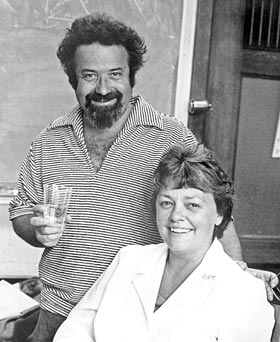UC Berkeley Press Release
Dr. Robert Mishell, professor emeritus of immunology, dies at age 73
BERKELEY – Dr. Robert Isaac Mishell, a professor emeritus of immunology at the University of California, Berkeley, whose work focused on the molecules that regulate the immune system, died March 6 of heart failure at a San Francisco hospice. He was 73.
Mishell's research included studying molecules secreted by microbes and that might improve the response of humans or animals to vaccines.
 Robert and Barbara Mishell in 1974. (Una Chen photo) |
The so-called Mishell-Dutton culture technique, invented in 1967, involved growing mouse spleen cells in Petri dishes and immunizing them against the red blood cells of sheep. The technique led to the discovery of B cells, T cells and macrophages, three key cell types in the immune system. The technique, a foundation for modern day HIV research, is still in use today to assess, for example, the effect of chemicals on the body's immune response.
A longtime anti-war and civil rights activist, Mishell traveled with his wife, Barbara, through the South in the 1960s registering blacks to vote. He later worked to improve the representation of minorities in academia and was a member of the Chancellor's Committee on Affirmative Action at UC Berkeley from 1980 until his retirement in 1988. He also established a program for the social and humanistic aspects of health science education.
As a member of the UC Faculty Peace Committee, he helped organize teach-ins against the Vietnam War, and later protested U.S. aid to the contra rebels in Nicaragua.
Mishell's career was cut short on Jan. 31, 1988, when he and his wife were tragically beaten. Contractor and Berkeley waterfront commissioner Enrique Zambrano showed up unexpectedly at the Berkeley home Mishell shared with his wife, a UC Berkeley research technician, beat them severely and left them for dead, according to police reports.
Mishell recovered from a fractured skull, but ended up abandoning his research and retiring from UC Berkeley to take care of his wife, who was left with permanent brain damage and was severely disabled and without speech.
"For the past 20 years, he dedicated all of his time and energy to my mother's recovery, allowing her to reach her full potential," said Mishell's son, Jacob Mishell, a San Francisco cardiologist. "We will greatly miss his unwavering devotion to my mother and the way he approached life's challenges with irreverent humor, kindness, generosity and humility."
The fact that Robert Mishell's accomplishments were made despite the fact that he suffered from bipolar disorder, which was inadequately treated for many years, makes them all the more remarkable, his son said.
"His wife carried him through periods of depression and elation that made life difficult," Mishell's colleague Wofsy added. After her injury, however, Mishell "devoted 100 percent of his life to her. It was a real love story. I've never seen anything like that sort of devotion to a person so badly disabled," said Wofsy.
Mishell, who was the co-author of 45 publications, had begun to write a book about his experiences caring for his wife, but had not finished it by the time of his death. Jacob Mishell said his father died at the hospice without suffering, with his wife by his side.
Zambrano was eventually arrested for the assault, but while out on bail, he murdered fellow waterfront commissioner and UC Berkeley employee Luis Reyna and, in 1993, was sentenced to death. That conviction was upheld last July by the California Supreme Court. Zambrano, who lived near the Mishells' residence and had installed a swimming pool deck for them three years before the attack, gave conflicting reasons for why he targeted the couple.
Mishell was born May 18, 1934, grew up in Los Angeles and graduated from Stanford University in 1955 with a B.A. and in 1958 with an M.D. After his internship at UCLA and residency at Stanford, he accepted a succession of fellowships, including two with the National Cancer Institute in Bethesda, Md., and one with the Scripps Clinic in La Jolla, Calif. He was hired as an assistant professor of immunology and microbiology at UC Berkeley in 1968 and became a full professor in 1976.
He is survived by his wife of 44 years, Barbara; his brother, Daniel Mishell Jr., a professor in and a former chairman of the Department of Obstetrics and Gynecology at the University of Southern California's Keck School of Medicine; a son, Jacob; and two grandchildren, Rebecca and Isaac.
An informal memorial service was held on March 9 in San Francisco. Contributions in Mishell's memory can be made to Amnesty International or the Southern Poverty Law Center.

